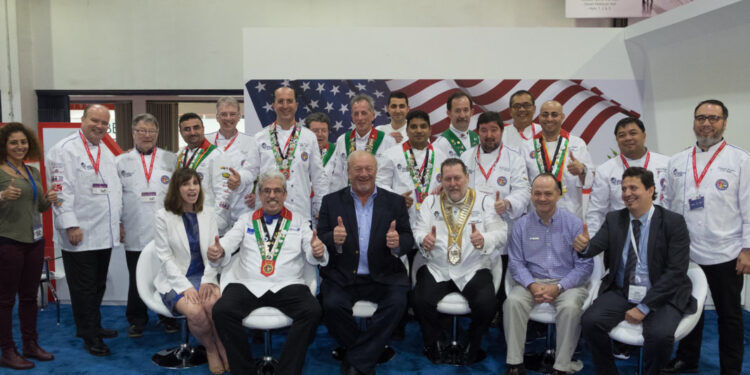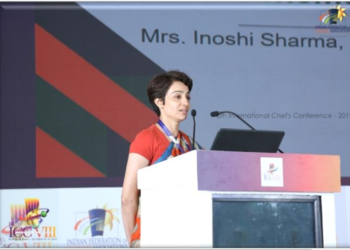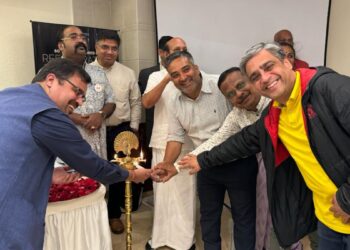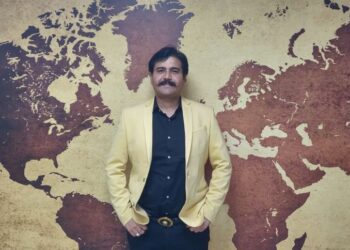
B Swaminathan | IMAWS
The Emirates Culinary Guild (ECG) is the UAE’s association of professional chefs. It is a non-profit-making organisation dedicated solely to the advancement of the culinary art of the UAE. In an exclusive interaction with KitchenHerald, Andy Cuthbert, president of Emirates Culinary Guild speaks on their association and their plans. Edited excerpts.
Swaminathan (Swami) Give us a small introduction to your association:
 Andy Cuthbert (Andy): Our constitution and bylaws revolve around training and developing the next generation of chefs. The seed for the association was planted in the 1990s by the founding leaders of the association. Training the next generation of chefs was the founding pillar of our association. What we had strived to do from the beginning was to enhance the ethnic cuisine through education, competition, and engagement with the Emirati community. We encourage the Emirati community to join the culinary industry. The ECG is a not-for-profit organization run only by volunteers across the UAE. Our association is highly inclusive, housing members from all walks of life viz. from people working for the flight kitchens, members who run their businesses, pastry artists other stakeholders in the community. We bring the complete spree of the entire UAE in the culinary pavilion and make the Emirates the hub for tourism, to match the vision of our Rulers. The ECG in its early days even became a member of the ‘World Chefs’, the global culinary association representing 105 member countries.
Andy Cuthbert (Andy): Our constitution and bylaws revolve around training and developing the next generation of chefs. The seed for the association was planted in the 1990s by the founding leaders of the association. Training the next generation of chefs was the founding pillar of our association. What we had strived to do from the beginning was to enhance the ethnic cuisine through education, competition, and engagement with the Emirati community. We encourage the Emirati community to join the culinary industry. The ECG is a not-for-profit organization run only by volunteers across the UAE. Our association is highly inclusive, housing members from all walks of life viz. from people working for the flight kitchens, members who run their businesses, pastry artists other stakeholders in the community. We bring the complete spree of the entire UAE in the culinary pavilion and make the Emirates the hub for tourism, to match the vision of our Rulers. The ECG in its early days even became a member of the ‘World Chefs’, the global culinary association representing 105 member countries.
Swami: Why is your association giving so much importance to training?
Andy: The use of digital, technology or Metaverse, we [chefs] need to progress as well. We need to reach and train more people and how we can train many chefs. We run scholarship schemes for chefs in need. There are plenty of young chefs across the world who do not have formal education in cookery. Together with our strategic education partner International Centre for Culinary (ICCA) in Dubai, we have a scholarship program called ‘Million Dirham’ Changing Lives programme. It is a sit-down program where we discuss with the chefs on their life stories. It is open only to people who do not have a qualification. We had discussions about unmarried mothers, and young men feeding families in India, Nepal, Sri Lanka or Arabic nations like Syria. We give opportunities to them and we have successfully entered 7th year and see transformation in them. That little hope we give for one person spreads to the entire family. We give as much as we can that transforms lives.
Swami: In the past 3 decades what are the key changes you note in the culinary scenario in the UAE?
Andy: The culinary scene has changed in UAE so much. When I landed 3 decades before, there were limited hotels were there. There were not many 5-star hotels. A lot of hospitality and restaurants in the 5-star hotels there were street-side restaurants in neighbourhoods like Al-Karama and Bur Dubai. There was not much development in UAE like what we see in Singapore, London, or Tokyo. We could not find many independent restaurants. Then there came hotels with plenty of restaurants. As the city evolved and Dubai started to expand we started seeing new locations. From a hotel perspective, we saw more developments post the entry of big malls with global cuisines coming into the malls.
As the city has grown and new residential areas have come, we see many independent restaurants have come. Some of the high-class restaurants across the globe found their home in Dubai. Now what do we see if the quality of independent restaurants had increased? Be it the quality of ingredients, the level of service has elevated the hospitality level of UAE to the next level. The trend now is to push independence and we also have cupcakes, chicken wings, and burgers, QSR trends are increasing, and the mall culture is making the quality of food outstanding in many places. Not just the quality of food, but the service delivery, elegance, and style and luxury level hotels have increased the hospitality scenario to a new level. On the other hand, new restaurants in the format of nightclubs, beach clubs, outdoor areas, and purpose-built areas by the government to build tourism set new trends to lead.
Many years ago, we all went to see Singapore to see what they do that can be replicated in the UAE. Now, it is the flip side. They [professionals from Singapore] come here to see Dubai or Abu Dhabi to take back to Singapore. We have a wide range of food for all nationalities. For example, let’s take Indian food. We have Indian food ranging from top cuisine to local street foods.
Swami: While UAE is a cosmopolitan country that includes multiple nationalities, how do you ensure the authenticity of regional cuisines?
Andy: For the regional cuisines food, we have the chefs from those soils. They know the art better. For good Italian cuisine, you bring a chef from Italy. Because Italian food is in his DNA and he had grown up with that. Whatever might be an expertise, it is always good to bring the local person. We need to go hyper-local. For example, a North Indian chef cannot master a Kerala food. Of course, we need to collect and collaborate with chefs from other nationalities. However, the lead would be the chef from the local nation.
Swami: There is a notion among chefs globally on the lack of interest among hospitality students to choose culinary as a profession. What is your take on that?
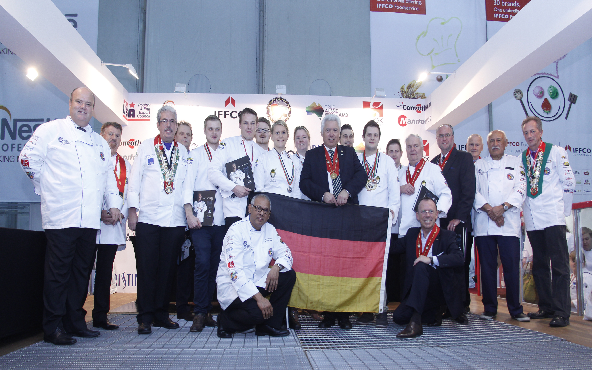 Andy: We see a lowering of culinary skills across the globe. A reluctance is increasing among students to enter the hospitality industry overall. Many think, they get paid more in other professions or they might find hospitality as a menial job. But, it is the passion in us that takes us ahead. Even today, I feel like a chef or waiter and I love to serve my guests. I take pride in that. If you aren’t keen on serving others, become an auto-mechanic and remember hospitality profession needs dedication.
Andy: We see a lowering of culinary skills across the globe. A reluctance is increasing among students to enter the hospitality industry overall. Many think, they get paid more in other professions or they might find hospitality as a menial job. But, it is the passion in us that takes us ahead. Even today, I feel like a chef or waiter and I love to serve my guests. I take pride in that. If you aren’t keen on serving others, become an auto-mechanic and remember hospitality profession needs dedication.
It is not that people are not ready to work as I get plenty of CVs in a day. We need to find innovation to bring interest among young minds. For example, a few years before, I had partnered with a culinary school in Kerala, India to offer internship programs for their students. Those students would not be trained anywhere but banquettes. I personally feel that the students get trained by me in banquettes, can’t be experienced anywhere else. They learn from inventory, catering, and costing from basics. In a restaurant, your kitchen does not move, your tables do not move. But the kind of knowledge they get in a banquet makes them easy when they face restaurants. In similar ways, we work with young chefs from various countries.
However, overall, there are still people who want to get into the culinary. The taboo around the culinary industry had moved. Social media and mainstream media have projected the positive sides of a chef including fame and what kind of things happen around. My request to the culinary schools is to tell the reality to the students. They need to stand the whole day on their feet. Many young people do not understand the facts about life.
In our regular events, we bring speakers who come to speak on life in general and the up-skilling of the lives. We bring speakers to speak on entrepreneurs, women empowerment, and more. Every Chef today was a dishwasher once. Students should constantly seek opportunities and expand. I somehow feel, that only a small minority of people are not willing to enter the kitchen. It is the job of the culinary schools to sell the dream of entering the industry. They should tell the advantages of the job including traveling across the world.
Swami: Globally chefs suffer in their personal life. How does your association campaign for a strong work-life balance?
 Andy: When the chef does not eat properly, it is their fault. It depends on what they want to do or their ultimate goal. If you want to start your restaurant, you need 7 days a week and three times a day. If a chef wants to try a new job after working for an organization they are also most welcome to do. Retention is increasing every day. Most individuals have different work-life balance. For example, a chef is a soul-bread winner of a family sending all the money earned in the profession back home. I would request the young professionals have life goals and work accordingly. Chefs should try to learn the techniques from other chefs on how they make their home food. Chefs should not miss the opportunity to work with chefs from other nationalities.
Andy: When the chef does not eat properly, it is their fault. It depends on what they want to do or their ultimate goal. If you want to start your restaurant, you need 7 days a week and three times a day. If a chef wants to try a new job after working for an organization they are also most welcome to do. Retention is increasing every day. Most individuals have different work-life balance. For example, a chef is a soul-bread winner of a family sending all the money earned in the profession back home. I would request the young professionals have life goals and work accordingly. Chefs should try to learn the techniques from other chefs on how they make their home food. Chefs should not miss the opportunity to work with chefs from other nationalities.
Today, large organizations have proper training, timings, and work-life balance. Today the chefs have the freedom of location, time, and money to decide and they can plan accordingly.
Swami: What is your view on increasing vegan food trends across the globe?
Andy: Concepts are vegetarian, vegan and Jain are increasing. My suggestion for developing a plant-based menu is to find simple ways to get proteins. For example, there is a dish ‘Alu Gobi’ in India which is plant-based. How do you and what you do for the masses are great. Eating styles are changing with concepts like vegetarian and vegan are important to understand. While I do agree sustainability and food security are super important, cooks should stand in the forefront not just as an educator but as an influence. But in my personal opinion, vegan or plant-based foods are an alternative to meat and can never be meat. I would recommend chefs to have options for vegetarian and vegan but there are still takers for meat.
But our culinary association and world chefs are on for the sustainability, longevity of the farming industry, food security, and feeding the planet. We strongly advocate for educating them on the advantages of this alternative food to enable them to make them take informed decisions. The change should happen for good and not just for the sake of change. While I am not sure, how long it would take for the trend of the alternative market will increase, it will increase for sure. May be the next generation should handle it.
Swami: What are the plans for your association in 2024?
Andy: ‘Zero food waste’ challenge is what we have as a competition for the young chefs in cards. We are developing the competition and not confirmed. We will be re-establishing junior and senior culinary teams to represent the national levels. The next plan is to train the team for competitions in Sharjah, Abu Dhabi, Germany, and Luxembourg. We lost track of the culinary teams during the COVID. We are seriously looking at a ‘metaverse’ scenario. So put short, it is competition, learning or training, looking into the future and sustainability are key priorities. We expand members through word of mouth and competition.
Some prominent names from the association:
Chef Majed Al Sabagh has been living in UAE since 1997 and holds a (Golden Visa). He is the Director of ‘The Chef International Hospitality Education and Training Centre in Sharjah. He is also a Master Chef certified by World Chefs and also works as an F&B consultant – at Sharjah Ladies Club. While he wears an additional hat as the founder and President Syrian culinary guild, he is the Vice president of the Emirate’s culinary guild for Sharjah, Ajman, and Umm Al Qween.

Some of the other privileges he has are being a member of the Heritage Cultural Committee in the World Chefs, an Honorary Member of the Indian Federation of Culinary Associations, and a member of Chain des Rotisseurs as OFFICIER MAITRE ROTISSEUR. He has judged in many culinary competitions around the world like Qatar, Maldives, Mauritius, Romania, Macedonia, Saudi Arabia, India, and UAE, and is teaching culinary art and food safety at the University of Ajman / UAE. He has also authored various cookery books and blogs about cooking innovative recipes and the importance of the presentations.
Dammika Herath is the Executive Pastry Chef, At Pullman Dubai Creek City Centre Hotel. Being an experienced pastry chef with 23+ years in South Asian and Middle Eastern luxury hotels, he never misses an opportunity to utilize expertise in crafting exquisite pastries & desserts, managing high-volume production, and leading teams to success. He is passionate about culinary excellence and innovation, eager to make a positive impact on an organization that shares these values.
He is the Pastry Development Committee Leader – Emirates Culinary Guild (UAE) alongside being a senior member of the Emirates Culinary Guild (UAE). He is also the Founder and Executive Committee member of the Sri Lankan Hospitality Professionals Association (UAE) and Executive Committee member of Toastmasters International.
Chef Atim Suyatim

Atim is an accomplished Chef with close to 3 decades of experience and with a proven ability to drive sales growth, reduce costs, and build business relations. Passionate, spirited, and classically well trained culinary professional. Multi-talented in various cuisines and especially in pastry and bakery. Skilled in building relationships and developing high-performance teams. Some of his professional strong hold areas include fine Dining expertise, Molecular Gastronomy, Employed Training and development, Budgeting and cost control, Banquets and catering, Food preparation Techniques, menu planning, procurements, and business revenue growth.

